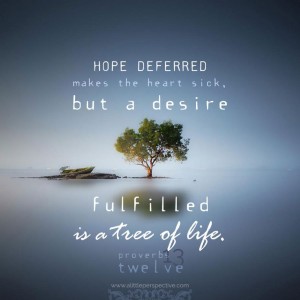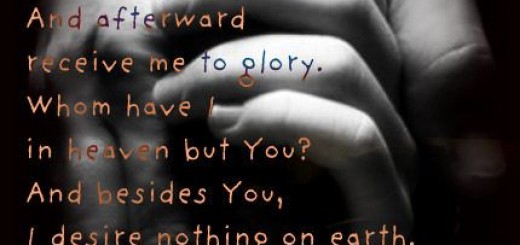Expectations


Proverb on hope.
I was chatting with a friend the other day about where relationships sometimes go sideways. The conversation wasn’t really about relationships, per se, but expectations in relationships.
William Shakespeare said, “the root of all heartache is expectations.” I don’t think the Bard is too far off. Yet, choosing to live assuming nothing good will ever come? I’d guess a walk like that would require one to lock the heart up tight and close it off to the possibility of joy. I’d rather walk into the pain that life and love inevitably bring, by making an attempt to focus on my expectations for myself instead of others. Who do I choose to be?
C.S. Lewis wrote on pain in, A Grief Observed. It was written after his wife passed away. He had met his wife late in life and I believe may have never thought he would get to experience a love relationship like the one he had with her, Joy. He said, “We were promised sufferings. They were part of the program. We were even told, ‘Blessed are they that mourn,’ and I accept it. I’ve got nothing that I hadn’t bargained for. Of course it is different when the thing happens to oneself, not to others, and in reality, not imagination.” (Their story was done by Anthony Hopkins and Debra Winger in the movie, Shadowlands.)
I like that, “the thing is different.” Definitely! The thing, a difficulty, a heartache, a tough path, is always harder when it’s in our own backyard. There is really no way to prepare for pain, no matter all the intellectual knowledge we have about life, love, pain or expectations.
On a different vein, Donald Miller says, “When you stop expecting people to be perfect, you can like them for who they are.” That one I like. It’s a description of letting go of expectations for other people to act in a way you believe is right. The goal would be to allow ourselves to look deeply at our people, and see beyond everyone’s goofy imperfections, annoying habits and general differences. A little bit like looking beyond the curtain of actions to the soul underneath.
Here, Bruce Lee and Stephen Hawking make a bit of sense as well.
“I’m not in this world to live up to your expectations and you’re not in this world to live up to mine.” Bruce helps us see that living life in order to meet another person’s expectations is a recipe for disaster. We lose ourselves when we do that.
And Stephen encourages us to chill out on demands from others. “My expectations were reduced to zero when I was 21. Everything since then has been a bonus.”
Maybe the ideas surrounding expectations are so varied that it is just another place in life where we can live and learn, and enjoy the process of discovery as we go. End of the day, it’s generally not a bad idea to offer love to those around us. There are no guarantees of how things in life will fall out but each one has to decide, how will I walk this road?




Stendal developed the concept of crystallization and used it in his novels. Stated simply this is a process of imputing to one you think you are in love with the ideals and values that are rooted in your own idea of the “perfect” other. Those ideals and values are often rooted in the mystical notions and fairy tales of childhood and then extended in adolescent day dreams about “living happily ever after.” The danger is three fold. First, they can blind you to issues that would normally terminate a relationship. Two, and perhaps most regrettable, they can blind you to the real character and quality of the other and close off opportunities for those qualities to become normative for you and the other as well. That means failing to understand the character of the image of God in the other (my words) or the essence of who they really are. That in turns means failing to apprehend the single most important asset that a couple has in one another. Third, as Stendhal says, crystallization works in reverse when a relationship ends with less than good terms. It results then in forming an idea of the other that places emphasis on everything negative and the polar opposite of those images of “happily ever after.” Doing that can result in transferring those negative ideas to “every man” or “every woman” destroying part of all of one’s own ability to relate to the other in a wholesome manner from that point on. If expectations are focused on one’s own interest rather than the task of working with the other in developing a unique “love language” that can only be shared by them as a unique couple then what can be expected is less than what is desired and certainly less than love’s real potential.
In 1822, French writer Marie-Henri Beyle, better-known by his pseudonym Stendhal, penned On Love (public library) — a timeless treatise attempting to rationally analyze the highest human emotion, rediscovered through a passing mention in the diaries of Susan Sontag (who famously and perhaps ironically wrote, “Nothing is mysterious, no human relation. Except love.”) http://Www.brainpickings.org
Thanks, Ron, you always add something to think about!
You continue to astound me! Write on!
Your support means the world! I’m on it! Jill
part of the crystallization process for those of us in churches is the assumption that if he or she is a Christian then it is okay. The divorce rate among Christians and especially conservative Christians suggests a real problem here. Being unequally yoked is about more than just saved and not saved. It is also about the character of His creative purpose for each individual and whether there is resonance with His creative purpose for both together. It is my consideration that we have failed in ever moving effectively from a time when marriages were arranged to our contemporary context. I see an essential absence in effective teaching that is perhaps 200 years behind times. Love is a choice but how it functions is related to its specific historical context. A movie that illustrates some of the tensions in this idea is Fiddler on the Roof where the lead asks his wife a simple question based on what the young people are saying, “Do you love me?” The question and the answer meant they understood something they had not quite seen before.
I don’t have a single rational thought on marriage at this point, I’ll have to watch that movie/play again.
I’m standing in your fan line, it’s the correct one, because your dear Mom is holding up a sign, on a stick, and it reads, “She got it from me”! #jillforpresident ❤️
Very subject of expectation, came up earlier today. Eureka! […There are no guarantees…but…how will I walk this road?]
Ballet, to dance or not to dance? A different road, yet for one of my daughters, it’s her choice, but once she decided, to walk the road with ballet, as a “love”, that choice, in and of itself, brings expectations with it, on her. Same as choosing to love another, think if we put the expectations on the participant, instead of the object of the affection, we would see more grace, more understanding, more looking at the perspective of the other person. Maybe, as Ron mentioned, more comprehension, patience, etc., and marriages staying intact.
Taking the time to give this more thought, I would probably, as a Believer, look to the scriptures, ask firstly, “What is expected of me?” If I park myself there, for a while, it might all circle back to what Jill wrote, […you can like them for who they are] [soul underneath…]. If we are expected to love one another, as He loved us, could this looking into the eyes to get to the soul bring us to like? Sounds backwards, yet maybe, love is divine, let it in, let in park and stay, so that like, which is human can and blossom in and around the soul.
I like how you write, “A little bit like looking beyond the curtain of actions to the soul underneath.” I can’t help but believe this is the way Jesus loves and how He wants us to love. Thank you for your insights!
Glad you took time on it Marcie, thank you!